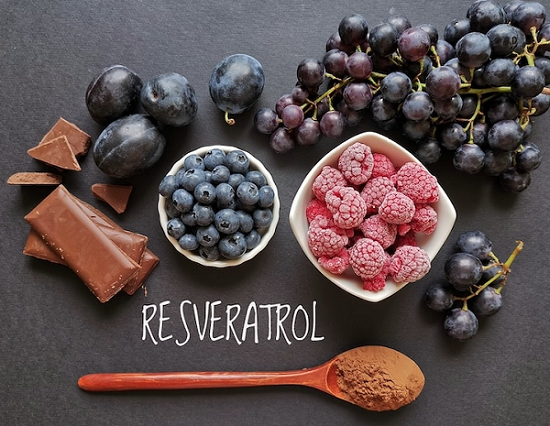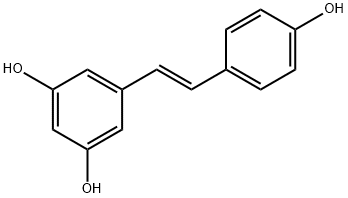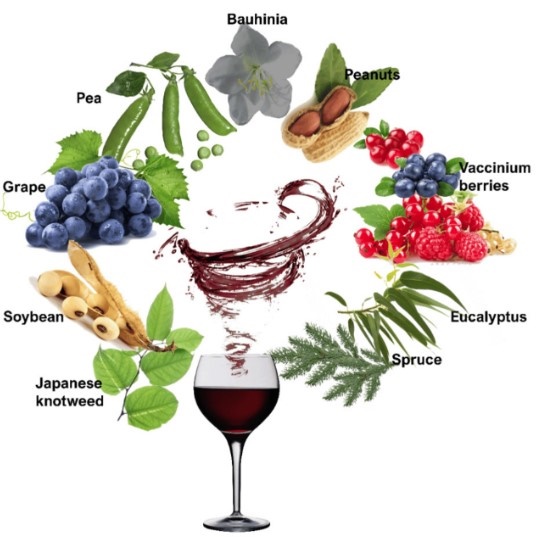The benefits of Resveratrol
Introduction
Resveratrol is a polyphenol that naturally occurs in numerous foods, such as blueberries and peanuts, and grapes and their derived products, like red wine. It is a well-known biologically active compound synthesized by plants undergoing infectious or ionizing radiation. Renaud and De Lorgeril were the first to relate wine polyphenols, such as resveratrol, to the potential health benefits attributed to regular and moderate wine consumption (the so-called “French Paradox”)[1]. Resveratrol has received increasing scientific attention, leading to an investigation into its biological activity and numerous publications.

Chemistry properties
Resveratrol is a stilbenoid polyphenol, possessing two phenol rings linked by an ethylene bridge. The formal chemical name (IUPAC name) of resveratrol is E-5-(4-hydroxystyryl)benzene-1,3-diol. The chemical structure of resveratrol (trans-3,5,4′-trihydroxystilbene) is identified in two isomeric forms, cis- and trans-resveratrol. Transform is dominant in its prevalence, and different biological activities are attributed to inducing cellular responses such as cell cycle arrest, differentiation, apoptosis, and enhancing cancer cells' anti-proliferation[2].
Benefits
Antioxidative Activities
Resveratrol has shown strong antioxidant properties in many studies. Resveratrol protects against oxidative stress, one of the primary contributors to many diseases, through various redox-associated molecular pathways. For instance, resveratrol upregulated the phosphatase and tensin homolog (PTEN), which decreased Akt phosphorylation, leading to an upregulation of antioxidant enzyme mRNA levels such as catalase (CAT) and superoxide dismutase (SOD). Resveratrol could also improve the antioxidant defense system by modulating antioxidant enzymes by downregulating extracellular signal-regulated kinase (ERK) activated by reactive oxygen species (ROS). Meanwhile, resveratrol reduced the ischemia-reperfusion injury-induced oxidative stress by inhibiting the activation of the p38 mitogen-activated protein kinase (MAPK) pathway; thus, the levels of antioxidants like glutathione (GSH) increased, and free radicals were directly scavenged[3].
Generally, resveratrol protects against oxidative stress mainly by (i) reducing ROS/reactive nitrogen species (RNS) generation; (ii) directly scavenging free radicals; (iii) improving endogenous antioxidant enzymes (e.g., SOD, CAT, and GSH); (iv) promoting antioxidant molecules and the expression of related genes involved in mitochondrial energy biogenesis, mainly through AMPK/SIRT1/Nrf2, ERK/p38 MAPK, and PTEN/Akt signaling pathways; (v) inducing autophagy via mTOR-dependent or TFEB-dependent pathway.
Anti-Inflammatory Activities
In many studies, Resveratrol has been shown to have potent anti-inflammatory properties. Resveratrol protects from inflammation not only by inhibiting the production of pro-inflammatory cytokines such as tumor necrosis factor α (TNF-α) and interleukin-1β (IL-1β) but also by inducing anti-inflammatory heme oxygenase-1 (HO-1) in RAW264.7 macrophages. Additionally, resveratrol suppressed IL-6 transcription, modulating the inflammatory responses as an estrogen receptor α (ERα) ligand-mediated by SIRT1, which functions as an ER coregulator. Resveratrol could also inhibit nuclear factor kappa-light-chain-enhancer of activated B cells (NF-κB) signaling independent of SIRT. Altogether, resveratrol was able to regulate the pro- and anti-inflammatory cytokines and chemokines to protect against inflammation, mainly by upregulating SIRT1, suppressing NF-κB, and the associated cascades, as well as inhibiting NALP3 inflammasome activation.
Immunomodulating Effects
Resveratrol has exerted immunomodulating effects in various studies. Resveratrol modulates immune response against pathogens like viruses, bacteria, and some toxic materials. For instance, resveratrol upregulated immune responses, reduced immunocyte apoptosis in chickens receiving conventional vaccinations, and improved the growth of young chickens. It could modulate both cellular and humoral immunity to reduce replication and the viability of pathogens and bidirectionally regulate the related cytokine/chemokine production through the canonical immune response pathways, as mentioned above.
Cardiovascular Diseases
In certain research, Resveratrol has been reported to protect against CVDs. Resveratrol prevented the pathological progression of hypertension, a significant risk factor of CVDs, through Nrf2 activation, owing to its antioxidant and anti-inflammatory capacity. Resveratrol could also lower blood pressure in hypertensive mice by inducing oxidative activation of cyclic guanosine monophosphate (cGMP)-dependent protein kinase 1α (PKG1α)
Cancers
Resveratrol has exhibited protective impacts on various cancers, like colorectal cancer, lung cancer, breast cancer, prostate cancer, ovarian cancer, cervical cancer, liver cancer, and gastric cancer. For instance, resveratrol was reported to inhibit the formation and growth of colorectal cancer by downregulating oncogenic KRAS expression. Resveratrol also prevented tumorigenesis and progression of non-small cell lung cancer (NSCLC) cells by interrupting glycolysis via inhibition of hexokinase II expression, which was mediated by downregulation of the epidermal growth factor receptor (EGFR)/Akt/ERK1/2 signaling pathway.
The substance has shown its anticancer bioactivities by impairing glycolysis, inhibiting cancer cell growth and proliferation, inducing apoptosis, promoting antitumor immune responses, and preventing adhesion, migration, and invasion of cancer cells by modulating related molecules and gene expression through various signaling pathways. Of note, different doses may lead to very different effects, which sometimes could be the opposite.
Liver Diseases and Diabetes
In some studies, Resveratrol has shown its protective impacts on several liver diseases. Specifically, resveratrol alleviated non-alcoholic fatty liver disease (NAFLD) by upregulating the low-density lipoprotein receptor (LDLR) and scavenger receptor class B type I (SRB1) gene expressions in the liver or by regulating autophagy and decreasing the activity of NF-κB, resulting from restoring its inhibitor, nuclear factor of kappa light polypeptide gene enhancer in B-cells inhibitor α (IκBα).
In addition, it has been elicited to attenuate diabetes and its relevant complications in many studies. Resveratrol was observed to significantly reduce blood glucose levels, plasma lipids, and free fatty acids in diabetic mice, and it inhibited the expression of inflammatory mediators (e.g., ICAM-1, vascular cell adhesion molecule-1, and MCP-1) both in the aorta and in the blood, by inhibiting the NF-κB pathway. In addition, resveratrol could relieve diabetes via increasing insulin action and glucose utilization due to visfatin expression restoration, SIRT1 activation, and glucose transporter modulation.
References
[1] Iqra Subhan, Yasir Hasan Siddique. “Resveratrol: Protective Agent Against Alzheimer’s Disease.” Central nervous system agents in medicinal chemistry (2024).
[2] Bahare Salehi. “Resveratrol: A Double-Edged Sword in Health Benefits.” Biomedicines 6 3 (2018).
[3] Xiao Meng. “Health Benefits and Molecular Mechanisms of Resveratrol: A Narrative Review.” Foods 9 3 (2020).
You may like
Related articles And Qustion
Lastest Price from Resveratrol manufacturers

US $1200.00-1100.00/ton2025-09-25
- CAS:
- 501-36-0
- Min. Order:
- 1ton
- Purity:
- 99%
- Supply Ability:
- 1000T/M

US $1200.00-1100.00/ton2025-09-12
- CAS:
- 501-36-0
- Min. Order:
- 1ton
- Purity:
- 99%
- Supply Ability:
- 1000T/M



